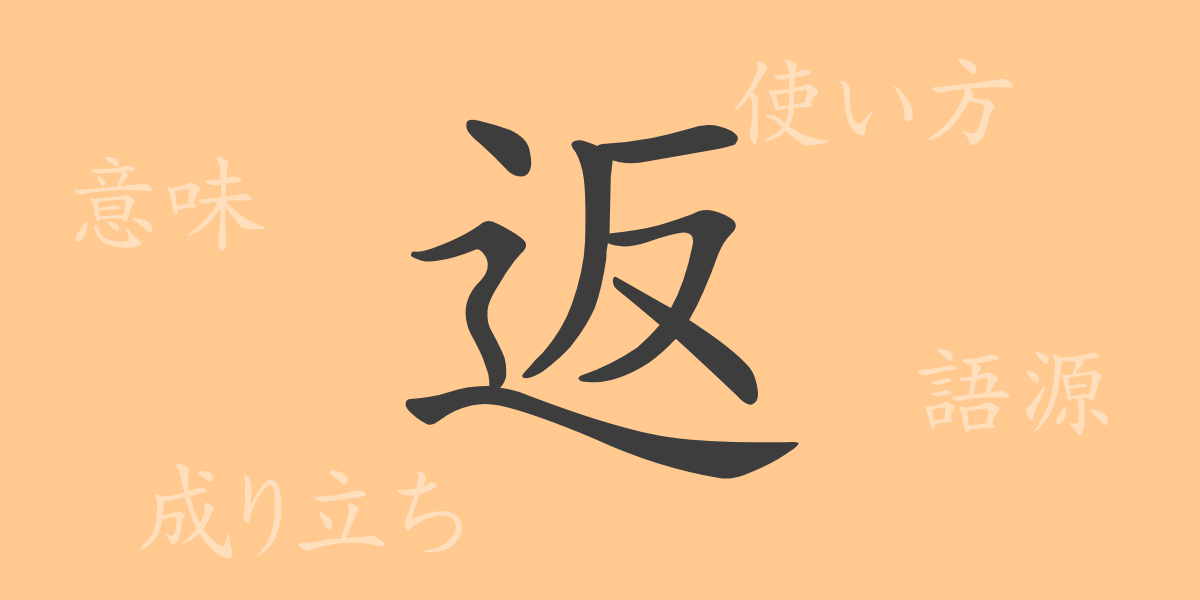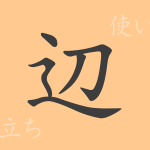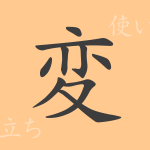The kanji (かんじ, “Chinese character”) that make up the Japanese language each have their own unique history and meaning, adding depth to the language. This time, we focus on the commonly used kanji “返” (へん, “hen”) in daily life, exploring its origin, meaning, usage, and even idioms and proverbs. Through this single character that symbolizes the beauty of the Japanese language, let’s rediscover the power of words.
- Origin (語源, “gogen”) of 返 (へん, “hen”)
- Meaning and Usage (意味と用法, “imi to youhou”) of 返 (へん, “hen”)
- Reading (読み方, “yomikata”), Stroke Count (画数, “kakusu”), and Radical (部首, “bushu”) of 返 (へん, “hen”)
- Compounds (熟語, “jukugo”), Idioms (慣用句, “kan’youku”), and Proverbs (ことわざ, “kotowaza”) Using 返 (へん, “hen”) and Their Meanings
- Summary (まとめ, “matome”) of 返 (へん, “hen”)
Origin (語源, “gogen”) of 返 (へん, “hen”)
The kanji “返” (へん, “hen”) is composed of the radical “辶” (しんにょう, “shinnyou”), which indicates movement, combined with “反” (はん, “han”), meaning “to turn back.” “反” (はん, “han”) signifies the act of turning back, indicating a return to the original state or direction. From this combination, “返” (へん, “hen”) came to represent actions such as returning or responding.
Meaning and Usage (意味と用法, “imi to youhou”) of 返 (へん, “hen”)
The kanji “返” (へん, “hen”) has basic meanings such as “to return” (かえす, “kaesu”) and “to come back” (かえる, “kaeru”). This encompasses not only physical acts of returning but also abstract concepts like replying, expressing gratitude, or reciprocating. Additionally, this kanji is used to form many words and expressions, with its usage being extremely diverse.
Reading (読み方, “yomikata”), Stroke Count (画数, “kakusu”), and Radical (部首, “bushu”) of 返 (へん, “hen”)
The usage of the kanji “返” (へん, “hen”) is widely seen in Japanese written and spoken language.
- Reading: The on’yomi (音読み, “Chinese reading”) is “ヘン” (へん, “hen”), and the kun’yomi (訓読み, “Japanese reading”) is “かえす” (かえす, “kaesu”) and “かえる” (かえる, “kaeru”).
- Stroke Count: It has a total of 7 strokes.
- Radical: The radical is 辶 (しんにょう, “shinnyou”).
Compounds (熟語, “jukugo”), Idioms (慣用句, “kan’youku”), and Proverbs (ことわざ, “kotowaza”) Using 返 (へん, “hen”) and Their Meanings
There are numerous compounds, idioms, and proverbs that include “返” (へん, “hen”), each conveying the richness of Japanese expressions. For example, “返事” (へんじ, “henji”) means the act of replying to someone’s question or request, “返済” (へんさい, “hensai”) means repaying borrowed money, and “報いを返す” (むくいをかえす, “mukui wo kaesu”) expresses the act of showing gratitude for received favors. A well-known proverb is “覆水盆に返らず” (ふくすいぼんにかえらず, “fukusui bon ni kaerazu”), which teaches that once something has happened, it cannot be undone.
Summary (まとめ, “matome”) of 返 (へん, “hen”)
Understanding the meaning embedded in each kanji character is crucial for deeply comprehending the Japanese language. “返” (へん, “hen”) is one such character that plays an important role in our language. From everyday conversations to business scenes and even proverbs, the presence of “返” (へん, “hen”) enriches our communication. We hope that through this article, you can experience the multifaceted nature and charm of the kanji “返” (へん, “hen”).

























